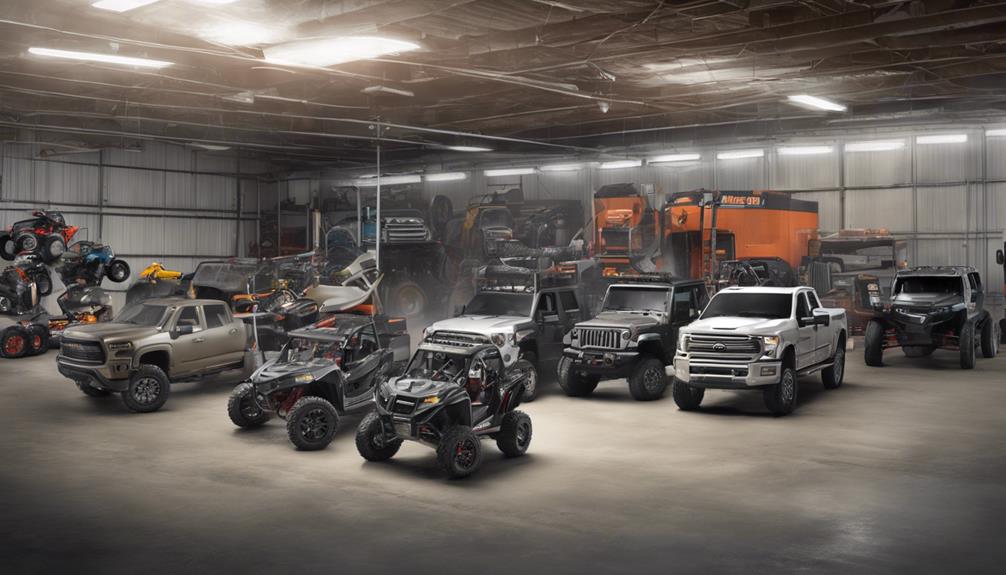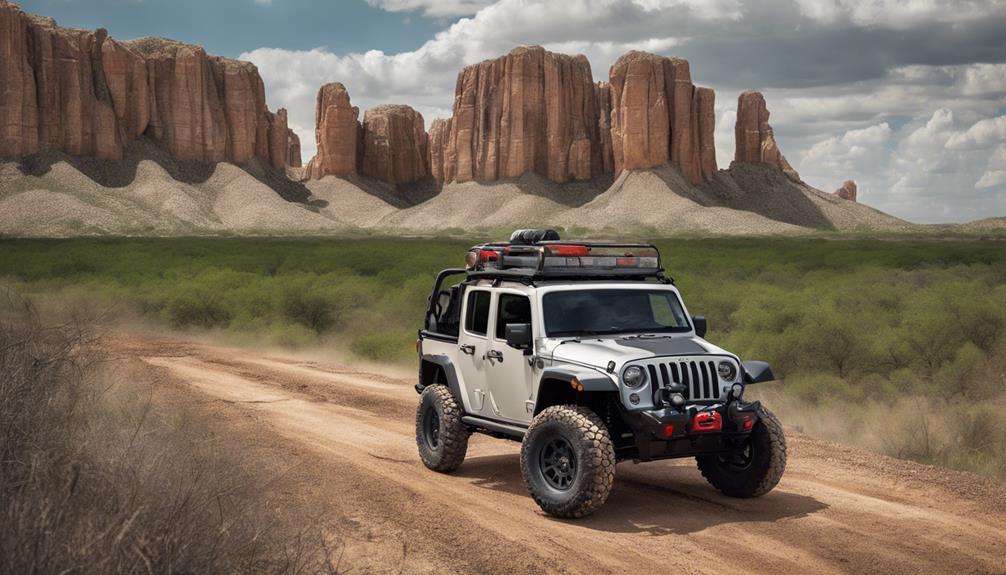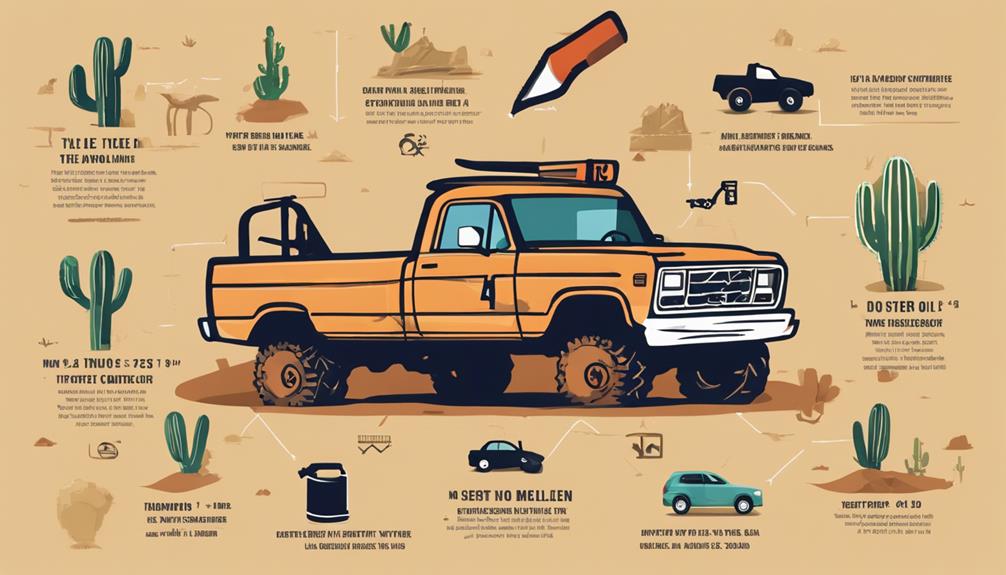Is it true that a well-maintained off-road vehicle ensures a safer and more thrilling adventure in the rugged terrains of McAllen, TX? You’ve likely heard this theory, and as a beginner, it’s crucial to understand the essence of a comprehensive maintenance checklist. Covering everything from tire inspections to fluid checks, this guide is designed to equip you with the knowledge to keep your vehicle in peak condition. But there’s more to it than just following a list. As you embark on this journey, you’ll discover how each component plays a pivotal role in your off-road experience, ensuring you’re prepared for what lies ahead.
Key Takeaways
- Regularly inspect tires, suspension, and undercarriage to ensure off-road readiness.
- Maintain and check fluids, air filters, and lubrication for optimal vehicle performance.
- Ensure safety gear, including first aid and fire extinguishers, are in good condition and not expired.
- Inspect and maintain recovery straps and winch to aid in emergencies and self-recovery.
Essential Pre-Trip Inspections
Before you venture into the rugged terrains, it’s crucial to conduct pre-trip inspections, ensuring your off-road vehicle’s tire pressure and tread depth are optimized for maximum traction and stability. This first step is not just about ticking boxes; it’s about embedding safety and reliability into your offroad adventure. Regular maintenance checks are your first line of defense against the unpredictable nature of the wild.
Tire pressure is more than a number; it’s a lifeline that connects you securely to the ground below. Too high, and you’ll find yourself skating across surfaces rather than gripping them. Too low, and you risk tire damage or even a blowout far from help. The sweet spot for your tire pressure depends on the terrain you’ll be tackling, so adjust accordingly.
Equally, tread depth plays a pivotal role in your vehicle’s ability to navigate through mud, sand, and rock. Inspect your tires for any signs of wear that might compromise your journey. It’s not just about the ability to move forward but to do so safely.
Don’t overlook the guardians of your vehicle’s underbelly – the skid plates. These unsung heroes protect your vehicle’s vital components from rocks, logs, and other off-road obstacles. A quick inspection for any signs of wear or damage can save you from a costly breakdown in the middle of nowhere.
Your offroad adventure awaits, but it demands respect, preparation, and a keen eye for detail. Regular maintenance and pre-trip inspections aren’t just chores; they’re your passport to the extraordinary experiences that lie beyond the paved roads.
Regular Maintenance Routines
Establishing a routine for regular maintenance is crucial for ensuring your off-road vehicle performs reliably and efficiently on challenging terrains. One key aspect you can’t overlook is checking and maintaining tire air pressure. Optimal pressure guarantees the best performance and traction, essential for your offroad adventures. It’s not just about preventing flats; it’s about maximizing your vehicle’s ability to navigate through rough, unpredictable landscapes.
Regularly inspect your vehicle’s AIR FILTER too. Off-roading exposes your engine to a lot more dust and debris than usual driving. A clean air filter ensures that your engine breathes easily, maintaining efficiency and preventing premature wear. It’s a simple step that can have a significant impact on your vehicle’s longevity and power.
Don’t forget to lubricate essential moving parts like zerk fittings, ball joints, and bushings. This maintenance step is vital for preventing wear and tear and ensuring smooth steering and suspension functionality. It’s a task that speaks directly to the heart of preserving your vehicle’s health and readiness for any adventure.
Monitoring and changing fluids according to the manufacturer’s recommendations is another pillar of regular maintenance. While the specifics of brake fluid, engine coolant, and transmission oil won’t be delved into here, understand that these fluids are the lifeblood of your vehicle. They keep mechanical issues at bay and ensure your off-road excursions are memorable for the right reasons.
Lastly, a thorough inspection of the driveline for glazing, cracks, or missing cogs is crucial. This vigilance helps in averting unexpected breakdowns and avoiding costly repairs, ensuring that your off-road vehicle is always ready for the next adventure.
What Are the Essential Maintenance Tips for Off-Road Vehicles for Beginners in McAllen TX?
For beginners in McAllen, TX, off-road vehicle maintenance advice is essential. Regularly checking tire pressure, fluids, and brakes is crucial to ensure safety and optimal performance. Cleaning the undercarriage and inspecting for damage after each off-road excursion can help prevent costly repairs.
Critical Fluids and Filters

Having covered the basics of regular maintenance routines, let’s now focus on the lifeblood of your off-road vehicle: critical fluids and filters. These elements are paramount to ensuring your machine runs smoothly, efficiently, and reliably, especially under the harsh conditions it faces off-road. You’re not just maintaining a vehicle; you’re upholding a lifeline that powers your adventures. Here’s what you need to keep an eye on:
- Engine Oil: Change every 3,000 to 5,000 miles. Engine oil is crucial for lubricating the moving parts within your engine, reducing friction, and preventing overheating. Neglecting this can lead to severe engine damage.
- Air Filters: Replace every 12,000 to 15,000 miles. Your vehicle’s air filter ensures that clean air reaches the engine, preventing dirt and debris from causing wear and tear. A clogged air filter can reduce performance and fuel efficiency.
- Coolant Levels: Check and top up regularly. Coolant prevents your engine from overheating, which is vital in preventing engine failure, especially after long periods of driving in challenging off-road conditions.
- Transmission Fluid and Differential Fluids: Replace these as per the manufacturer’s recommendations. These fluids are essential for the smooth operation of your vehicle’s transmission and differential, ensuring that power is efficiently transmitted from the engine to the wheels.
Tire and Suspension Care
Ensuring your vehicle’s tires are properly inflated and the suspension system is in top condition is crucial for optimal off-road performance and safety. Tire pressure isn’t just a number; it’s the lifeline of your off-roading adventures. It ensures your vehicle has the traction it needs on unpredictable terrains, preventing slips and slides. But it’s not just about the pressure; tire wear can significantly impact your ride’s performance. Regularly inspecting your tires for wear, cracks, or any embedded objects is essential to avoid unexpected failures.
Moreover, your vehicle’s suspension plays a pivotal role in how it handles off-road challenges. Proper suspension alignment ensures your vehicle stays stable and responsive, regardless of the terrain. But alignment is just the start; the condition of your suspension components can make or break your off-road experience. Regular checks for damage or wear on these components are crucial, and considering upgrades can significantly enhance your vehicle’s off-road capabilities and durability.
To help you keep track, here’s a quick checklist:
| Task | Frequency | Emotion Evoked |
|---|---|---|
| Check tire pressure | Before each off-road trip | Confidence |
| Inspect tires for wear | Regularly | Assurance |
| Rotate tires | As recommended | Reliability |
| Suspension alignment | Periodically | Stability |
| Inspect suspension components | Regular inspections | Trust |
Safety Gear and Equipment Checks

After addressing tire and suspension care, it’s equally critical to focus on your off-road vehicle’s safety gear and equipment checks to guarantee preparedness for any unforeseen challenges. As part of the McAllen, TX off-road community, you’re not just a thrill-seeker; you’re a responsible adventurer ensuring the safety of yourself and others. Here’s a detailed checklist to help you maintain your essential safety gear:
- Fire Extinguisher and First Aid Kit: Regular inspections are a must. Check expiration dates on your fire extinguisher and ensure all items in your first aid kit, including the emergency blanket, are in excellent condition and haven’t expired.
- Tire Repair Kit and Recovery Straps: Your tire repair kit should be complete and ready for use. Examine recovery straps for any signs of wear or damage that might compromise their integrity in critical moments.
- Portable Air Compressor and Appropriate Tires: Confirm your portable air compressor is functioning correctly. Additionally, make sure your tires are suitable for the terrain you plan to conquer, as this significantly impacts safety and performance.
- Winch Inspection: Test your winch to ensure it’s in proper working order. A functional winch can be a lifeline in emergencies, facilitating self-recovery or helping others in distress.

No Responses